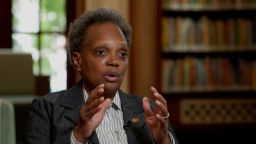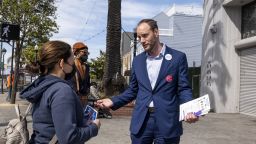Editor’s Note: David Axelrod, a CNN senior political commentator and host of “The Axe Files,” was a senior adviser to former President Barack Obama and chief strategist for the 2008 and 2012 Obama presidential campaigns. He was a City Hall reporter for the Chicago Tribune and later was the media strategist for seven successful Chicago mayoral campaigns. The opinions expressed in this commentary are his own. View more opinion on CNN.
Four years ago, Lori Lightfoot captured almost 74% of the vote en route to an historic election as Chicago’s mayor.
The first Black woman and first lesbian to lead the city, the former prosecutor upended the political establishment with promises to clean up a city weary of corruption.
But, on Tuesday, Lightfoot’s reign came to a screeching halt in a manner as stunning and decisive as the landslide that swept her into office.
Lightfoot managed just 17% of the vote in a nine-way general election, failing to make the April 4 runoff that will now pit former school superintendent Paul Vallas against County Commissioner Brandon Johnson.
“Obviously, we didn’t win the election today, but I stand here with my head held high and a heart full of gratitude,” Lightfoot told her supporters after the polls closed.
“You will not be defined by how you fall. You will be defined by how hard you work and how much you do for other people,” she added.
It was a classy and dignified concession from a pugnacious mayor who often seemed to favor the middle finger over the middle ground.
Lightfoot was smart, quick and always spoiling for fight, defending the city against its detractors – from former President Donald Trump to Sen. Ted Cruz of Texas – and anyone else who unfairly caricatured her city as an urban dystopia.
She stood up for immigrants and worked to refocus resources to impoverished neighborhoods on the city’s south and west sides.
Confronted with an unprecedented public health crisis within her first year in office, she generally won decent marks for her handling of it. But one element of that crisis – the scourge of rampant violence that spiked during the pandemic – contributed greatly to her repudiation at the polls on Tuesday.
Crime – a perennial issue that has bedeviled mayors for decades – is far and away the top concern of Chicago voters. And while she could claim some progress in the past year over 2021, Lightfoot was widely considered a failure on the critical issue of public safety.
Her handpicked police chief, David Brown, recruited from Dallas, seemed overmatched in a city and a department often impenetrable to outsiders. And Lightfoot’s unwillingness to dismiss her police chief, who often seemed isolated from his officers and the community, left voters with little hope for change. (Brown announced his resignation on Wednesday following Lightfoot’s election loss.)
But Lightfoot’s fall is a more complicated story that goes to a clenched-fist, go-it-alone style of leadership that made consensus hard to build and drove many who should have been her allies away.
Reared in the industrial belt of Northeast Ohio, the daughter of a factory worker and a health care aide, Lightfoot fought her way up to the University of Chicago Law School and, ultimately, to the US attorney’s office with a stint as president of the Chicago Police Board.
When she ran for mayor, her status as a crusading outsider with prosecutorial zeal was core to her appeal.
But those pugilistic qualities quickly became obstacles in a job that often requires an ability to cajole, and not simply command.
Early in her term, Lightfoot stubbornly took a teacher’s strike many deemed avoidable, and then settled on the union’s terms.
Deeply suspicious of the motives of other politicians, she systematically alienated Gov. J.B. Pritzker, the Democrat-led state legislature and the Cook County leadership, all of whom are fellow Democrats.
As a result, she lost key legislative battles, including a law that over the next three years will shift control of the Chicago public schools from mayoral appointees to an elected 21-member school board, far larger than what she had wanted and the largest by far in the country.
She ran on limiting the prerogatives of City Council members, then humiliated them in her inaugural speech and alienated them in the job, prompting one of her once-allies Alderman Susan Sadlowski-Garza to say, “I have never met anybody who has managed to piss off every single person they come in contact with. Police, fire, teachers, aldermen, businesses, manufacturing.”
The exodus of some high-profile businesses – and the likely, unthinkable departure to the suburbs of the city’s beloved Chicago Bears – contributed to a sense of a city backsliding.
By the time of the election, more than half of Chicago voters gave the mayor negative ratings.
In winning and losing, Lightfoot did it her way. Now Chicago will have a new mayor – and a race that will be the most ideologically divergent in recent history.
Vallas, who is White and endorsed by the Fraternal Order of Police, ran almost exclusively on public safety and the promise to add officers to fight crime. He finished with 34% of the vote, far ahead of the field, but well short of the 50% necessary to win without a runoff.
Johnson, who is Black, was relatively unknown to much of the city before being put forth by the Chicago Teacher’s Union, for whom he has worked as an organizer. Once a vocal supporter of defunding police, Johnson alone among the major candidates has eschewed promises of more cops.
Get our free weekly newsletter
- Sign up for CNN Opinion’s newsletter.
- Join us on Twitter and Facebook
It is a stark choice and portends a pitched and divisive battle.
Fighter until the end, the mayor spent weeks of advertising, effectively hammering a fourth candidate she feared the most, US Rep. Jesus “Chuy” Garcia, only to be edged out for a spot in the runoff by Johnson.
Now the reigning champion will be forced to watch from the sidelines and contemplate her meteoric rise and fall.
Lightfoot was elected as a loner – an outsider – and to a shocking degree, she will leave City Hall the same way.
An earlier version incompletely described the part of Ohio in which Lori Lightfoot was raised.




